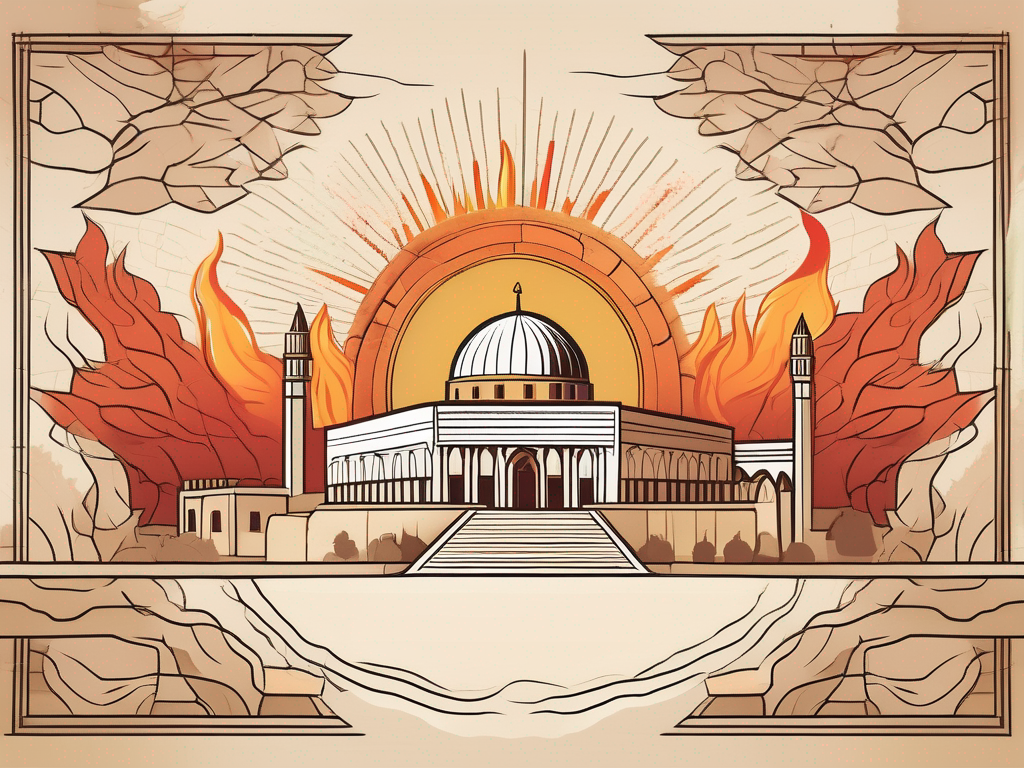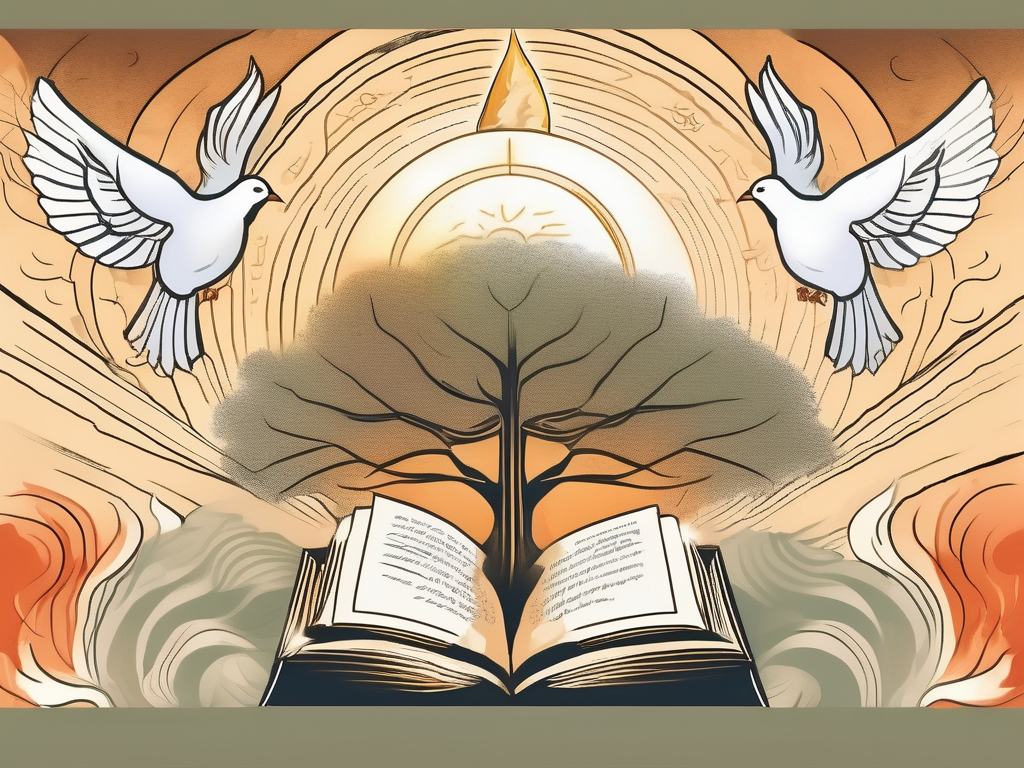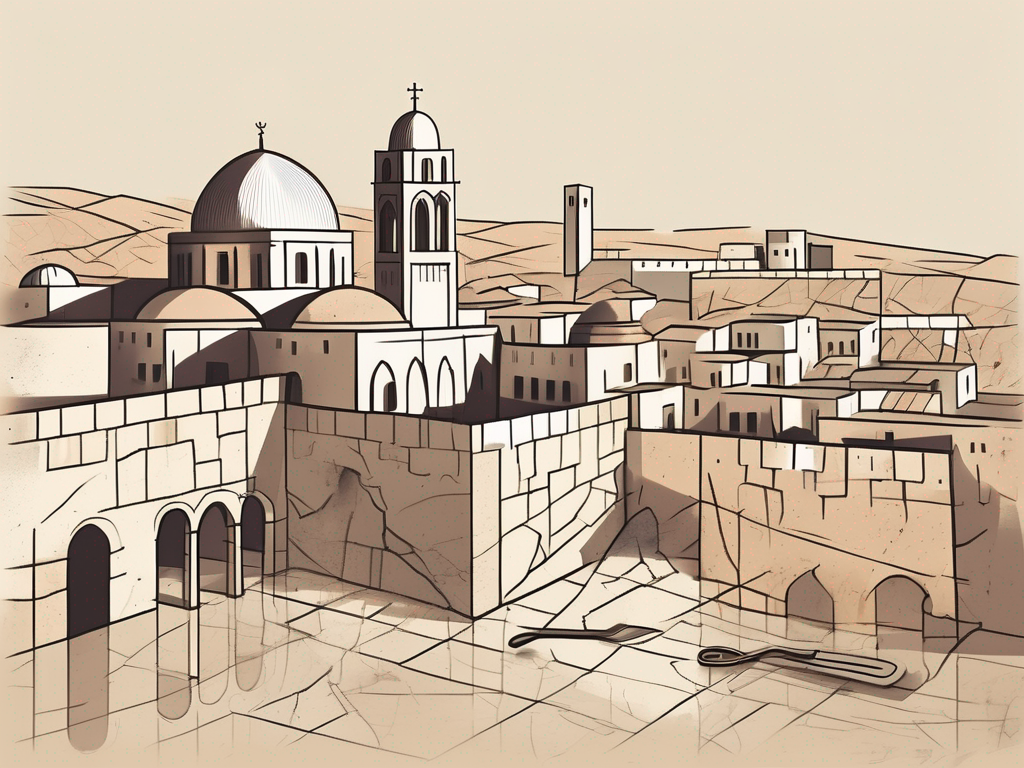The Book of Ezekiel is a fascinating and thought-provoking part of the Bible that offers deep insights into human nature and divine wisdom. In order to fully appreciate the significance of this book, it is important to understand the context in which it was written.
Understanding the Context of the Book of Ezekiel
The historical background of Ezekiel plays a crucial role in interpreting its messages and prophecies. Ezekiel, a priest and prophet, lived during a time of great turmoil for the people of Israel. He witnessed the destruction of Jerusalem and the exile of the Israelites to Babylon. This context greatly influenced the themes and teachings found in the book.
Ezekiel’s firsthand experience of the destruction of Jerusalem and the exile of his people to Babylon gave him a unique perspective on the consequences of disobedience to God’s covenant. As a priest, he had a deep understanding of the religious practices and rituals that were central to the Israelite faith. This knowledge allowed him to speak with authority and conviction when delivering his prophecies.
The Historical Background of Ezekiel
During Ezekiel’s time, the Israelites had strayed from their covenant with God and had engaged in idolatry and other sinful practices. The people had turned their backs on the true worship of Yahweh and had instead embraced the gods of the surrounding nations. This departure from their faith led to a breakdown in their relationship with God and ultimately resulted in the destruction of their beloved city, Jerusalem.
Ezekiel’s prophecies address this historical context and call the people of Israel to repentance and restoration. He reminds them of the covenant they had made with God and warns them of the consequences of their disobedience. Through his powerful and vivid imagery, Ezekiel paints a picture of the destruction that awaits them if they do not turn back to God.
The Literary Structure of Ezekiel
Ezekiel’s book is divided into three sections: judgment, hope, and restoration. The judgment section describes God’s wrath against the Israelites for their disobedience. Ezekiel vividly portrays the consequences of their actions, using symbolic acts and visions to convey the severity of their sins. Through these prophecies, he warns the people of the impending judgment that will befall them if they do not repent.
The section of hope offers a glimpse of God’s future restoration of His people. Ezekiel prophesies about the coming of a new covenant, where God will gather His scattered people from all corners of the earth and bring them back to their land. He speaks of a time when God will pour out His Spirit on the people, transforming their hearts and enabling them to walk in His ways once again.
The final section focuses on the rebuilding of the temple and the establishment of a renewed relationship between God and His people. Ezekiel describes in detail the dimensions and design of the future temple, emphasizing its significance as a place of worship and communion with God. He envisions a time when the glory of the Lord will return to the temple, signifying His presence among His people.
In conclusion, the historical context of Ezekiel provides a backdrop for understanding the messages and prophecies contained within the book. Ezekiel’s personal experiences and his deep knowledge of the Israelite faith allowed him to deliver powerful and impactful messages to his fellow exiles. Through his prophecies, he called the people of Israel to repentance, offered them hope for a future restoration, and envisioned a renewed relationship between God and His people.
The Wisdom of Ezekiel: Key Themes and Messages
One of the key themes found throughout Ezekiel is the concept of responsibility. Ezekiel emphasizes that each individual is accountable for their own actions and that God’s judgment is based on personal righteousness. This message of personal responsibility serves as a reminder that we have control over our own choices and must be mindful of the consequences they may bring.
Ezekiel’s teachings go beyond the surface level of personal responsibility. He delves into the intricacies of human nature and explores the complex relationship between free will and divine sovereignty. Through his prophecies, Ezekiel reveals that while humans have the freedom to make choices, God’s sovereignty ultimately shapes the course of events. This profound understanding challenges us to reflect on the delicate balance between our own agency and God’s divine plan.
The Concept of Responsibility in Ezekiel
Ezekiel’s teachings emphasize that God’s judgment is not arbitrary but is a result of the choices made by individuals. He highlights the importance of personal repentance and transformation, urging the Israelites to turn away from their sinful ways and seek forgiveness. The concept of responsibility in Ezekiel serves as a timeless reminder that our actions have consequences and that we are called to live in accordance with God’s will.
Furthermore, Ezekiel’s teachings on responsibility extend beyond the individual level. He also addresses the responsibility of leaders and shepherds in guiding and caring for the people. Through his prophecies, Ezekiel condemns the leaders who have neglected their duties and warns of the dire consequences that await them. This serves as a cautionary tale for all leaders, reminding them of the weighty responsibility they bear in their roles.
The Theme of Restoration in Ezekiel
Despite the judgment and destruction that befell the Israelites, Ezekiel also offers a message of hope and restoration. He prophesies about God’s plan to bring His people back to the land of Israel, to rebuild the temple, and to restore the covenant relationship between God and His chosen people. This theme of restoration teaches us that no matter how dire the circumstances may be, God’s faithfulness and mercy will ultimately prevail.
Ezekiel’s prophecies of restoration not only speak to the Israelites of his time but also resonate with believers throughout history. They remind us that even in the midst of brokenness and despair, God is at work, bringing about healing and renewal. This theme of restoration invites us to trust in God’s promises and to have faith that He will bring about restoration in our own lives and in the world around us.
Furthermore, Ezekiel’s prophecies of restoration also carry a message of reconciliation. He envisions a future in which the divided tribes of Israel will be united once again under the leadership of a righteous king. This vision of unity and harmony serves as a powerful reminder of the importance of reconciliation and the healing power of forgiveness. It calls us to seek reconciliation in our own relationships and to work towards unity and peace in our communities.
The Prophecies of Ezekiel: An Overview
Ezekiel’s prophecies provide a glimpse into both the immediate future of Jerusalem and the long-term plans of God for Israel. These prophecies offer valuable insight into the workings of divine providence and can be seen as a testament to the accuracy and reliability of God’s Word.
Ezekiel, a prophet during the Babylonian exile, was chosen by God to deliver His messages to the people of Israel. His prophecies were not only meant to warn and guide the Israelites in their present circumstances but also to reveal God’s ultimate plan for their redemption and restoration.
One of the most significant prophecies in Ezekiel is his prediction of Jerusalem’s destruction. Ezekiel prophesied this event years before it happened, warning the people of Israel about the consequences of their disobedience. The fulfillment of this prophecy serves as a powerful reminder of the faithfulness of God and the importance of heeding His warnings.
Ezekiel’s vivid descriptions of the impending destruction of Jerusalem paint a grim picture of the city’s fate. He speaks of the invading armies, the siege, and the devastation that will befall the once glorious city. Through these prophecies, God reveals His righteous judgment upon the wickedness and idolatry that had consumed the people of Jerusalem.
However, alongside the prophecy of destruction, Ezekiel also offers a message of hope and restoration for the nation of Israel. He prophesies about the regathering of the Israelites from exile and their return to the promised land. This prophecy was partly fulfilled when the exiles returned to Jerusalem after the Babylonian captivity, but it also points to a future restoration that is yet to come.
Ezekiel’s prophecies of restoration are filled with images of renewal and blessings. He speaks of a time when the desolate land will be transformed into a flourishing garden, when the people of Israel will be united under one ruler, and when God’s presence will dwell among them once again. These prophecies offer hope and comfort to the Israelites, assuring them that God has not abandoned them and that He has a glorious future in store for them.
As we study the prophecies of Ezekiel, we are reminded of the intricate tapestry of God’s plans and purposes. His prophecies reveal His sovereignty, His justice, and His unfailing love for His people. They serve as a reminder that even in the midst of destruction and despair, God is at work, bringing about His ultimate plan of redemption and restoration.
Interpreting Ezekiel’s Vision of the Dry Bones
One of the most famous visions in the book of Ezekiel is his vision of the dry bones. This vision is packed with symbolism and carries deep theological implications that are relevant for us today.
Ezekiel, a prophet during the Babylonian exile, was given this vision by God to convey a powerful message to the Israelites. It was a time of great despair and hopelessness for the people, as they were living in a foreign land, far away from their beloved Jerusalem. The vision of the dry bones served as a visual representation of their current state – lifeless, broken, and without hope.
The Symbolism in the Vision
In this vision, God shows Ezekiel a valley filled with dry bones and asks if they can live again. Through this powerful image, God illustrates the desolation and hopelessness of the Israelites in exile. The bones, once vibrant and alive, now lay scattered and lifeless, representing the spiritual and emotional state of the people.
As Ezekiel looks upon this scene, he witnesses a miraculous transformation. The bones begin to come together, bone to bone, as sinews and flesh cover them. Finally, breath enters their bodies, and they stand up as a vast army. This incredible transformation symbolizes God’s ability to bring life out of death, to restore what was broken, and to breathe hope into the hopeless.
Furthermore, the vision of the dry bones also symbolizes the promise of restoration for the Israelites. It serves as a reminder that even in their darkest hour, God has not abandoned them. Just as He brings life to the dry bones, He will bring life back to His people. The vision is a powerful testimony to God’s faithfulness and His ability to bring about redemption and renewal.
Theological Implications of the Vision
Ezekiel’s vision of the dry bones reminds us of God’s power to bring life out of death and hope out of despair. It serves as a reminder that no matter how dire our circumstances may appear, God is able to bring restoration and renewal. Just as He breathed life into the dry bones, He can breathe new life into our brokenness and despair.
This vision also highlights the importance of faith and obedience in our relationship with God. The Israelites in exile were called to have faith in God’s promises and to trust in His ability to restore them. Similarly, we are called to have faith in God’s power and to obediently follow His guidance. It is through our faith and obedience that we open ourselves up to God’s transformative work in our lives.
Furthermore, the vision of the dry bones reminds us that God’s power is not limited by our circumstances. No matter how hopeless or impossible a situation may seem, God is able to bring about transformation. He can breathe life into the driest of bones and bring about a revival that surpasses all expectations.
As we reflect on Ezekiel’s vision of the dry bones, let us be encouraged and inspired by the hope it offers. Let us trust in God’s power to bring life out of death and to restore what is broken. And may we have the faith and obedience to allow God to work in our lives, knowing that He is able to bring about transformation and renewal beyond our wildest dreams.
The Relevance of Ezekiel’s Prophecies Today
While the book of Ezekiel was written thousands of years ago, its messages and teachings still carry great relevance for us today. The lessons and insights found in these prophecies have the power to transform our lives and provide guidance for navigating the challenges of contemporary society.
Lessons for Contemporary Society
Ezekiel’s teachings on personal responsibility and repentance are especially applicable in today’s world. The messages of accountability and the need for moral and ethical living resonate with the current social and cultural issues we face. The call for personal transformation reminds us that our choices have consequences and encourages us to seek righteousness in all aspects of our lives.
Ezekiel’s Influence on Modern Theology
The book of Ezekiel has had a significant impact on modern theology and biblical interpretation. Its themes of judgment, restoration, and the role of personal responsibility have shaped theological discussions and influenced the understanding of God’s plan for redemption. The book of Ezekiel continues to provide a source of inspiration and guidance for theologians and believers alike.
In conclusion, the Book of Ezekiel offers a wealth of wisdom and prophetic insights that are still relevant today. Its teachings on personal responsibility, restoration, and God’s faithfulness provide valuable lessons for navigating the challenges of contemporary society. By exploring the historical context, key themes, prophecies, and visions found in Ezekiel, we can gain a deeper understanding of God’s wisdom and uncover timeless truths that can transform our lives.












